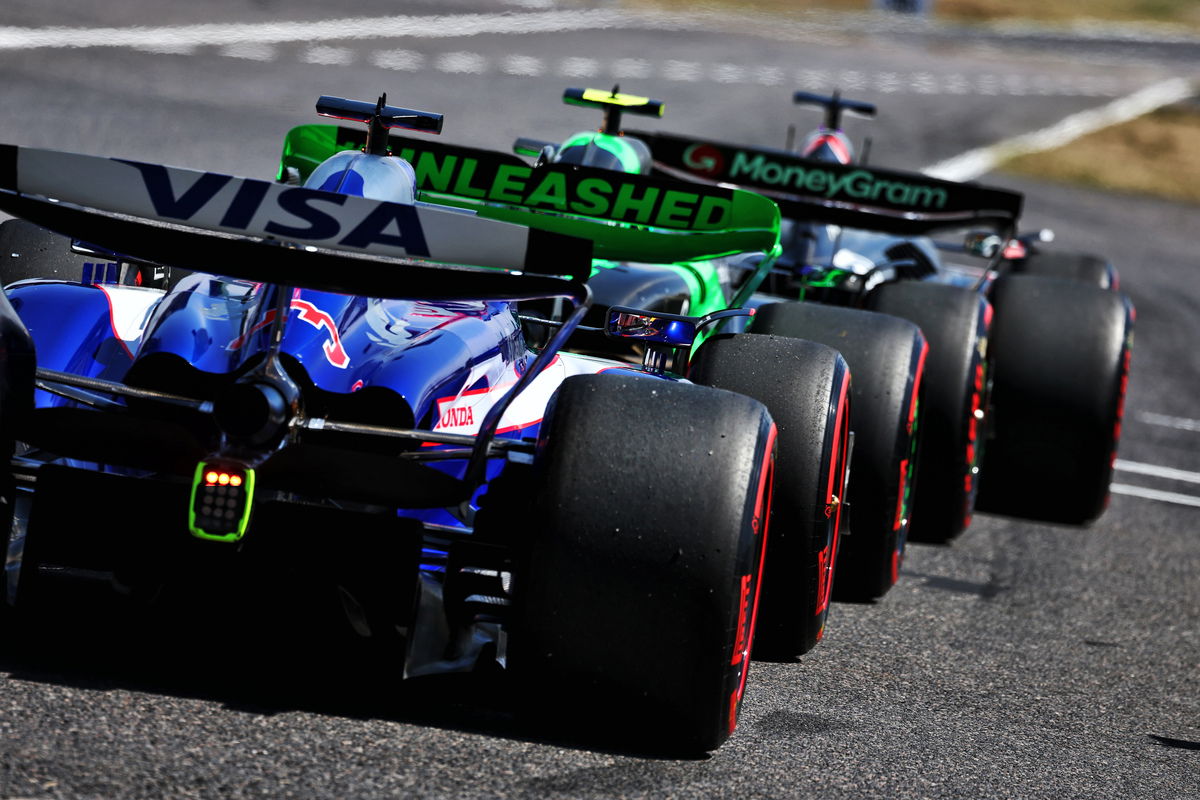

Under the regulations, teams are allowed to purchase specific components for others.
Haas’ business model relies heavily on that fact through its link with Ferrari, while Aston Martin and Williams have deals with Mercedes beyond just the supply of power units.
“We can buy certain parts of the team, and so we buy the parts, we put them on the car,” Bayer told Speedcafe.
“I think the most important advantage of that is that we can focus on developing other stuff, because we simply don’t have the capacity, the budget, the people.
“For example, we don’t have suspension designers, the last one we had has been signed by (Ferrari boss) Fred Vasseur – so clearly he was in Italy and he was a very good one!
“So we knew how to do a suspension but we actually realised we want to buy those parts because it allows us to focus on other bits to remain competitive.”
It is a reasonable and fair model under the regulations, though begs the question of the need for such allowances.
The practice was introduced as a means to keep costs down as teams battled for survival while keeping them somewhat competitive while still short of allowing fully-fledged customer cars.
“There were two reasons, actually,” Bayer explained.
“One was the financial support for teams. The second one was to try and create close racing.
“If you look at last year’s world championship results and you add the points from the bottom four teams, they had together less points than the team on P6.
“You add the team on P6, those five teams together had less points than the team on P5.
“What does that mean? Well, it means that the field is extremely spread.
“Look at this year. We have three groups now. We have Max, we have P2 to P10, and we have P11 to P20.
“For us, P11 is like pole position because, when the top five teams bring both cars to the finish, there is no way…
“We need to actually hope somebody makes a mistake, somebody has some technical issue or otherwise it will be very, very difficult for any of the bottom five today to score points.”
But the financial landscape has changed and while some team owners continue to invest, they do so to improve the operation rather than simply keep it afloat.
Regulations are now far more prescriptive than they once more, and while there is freedom for clever engineers, the gains are comparatively marginal as a consequence.
The financial benefit of buying in components is therefore questionable, and the competitive argument is reduced.
As such, there’s an argument that allowing components to be bought and sold is no longer relevant, though Bayer disagrees with that sentiment.
Nonetheless, such is Bayer’s opinion that he’s met with F1 boss Stefano Domenicali and discussed extending the list of parts teams are allowed to share.
RB is partnered with the best-in-class organisation, so potentially stands to gain out of such a move.
But while Bayer’s argument for increasing the parts teams can purchase from one another, and speaks to the desire and the positives of the existing situation, it fails to address its ongoing need.
All existing teams are financially stable and could, therefore, invest their funding internally rather than buying in parts. They do so because they perceive a competitive advantage in doing so.
And it may be that, as things stand, they don’t have capacity internally to develop some components – such as RB’s lack of suspension engineers.
Again, that speaks to the situation as it is and where each organisation sees its dollars best spent within the regulations as they are, not whether those regulations are still suitable.
It’s a critical question and, indirectly, one of the primary concerns within the paddock and the Red Bull Racing/RB relationship.
RB is owned by Red Bull, which holds a unique position in Formula 1 given it owns two operations.
That affords it opportunities to scale its investment in a way none of its rivals can but also leaves it exposed to concerns surrounding collusion and anticompetitive behaviour.
RB is in a position to gain courtesy of its relationship with Red Bull Racing through the transfer of components (which are, in fairness, well-governed under the regulations) but also through the comparatively free transfer of staff.
The latter is a difficult issue to address as it’s impossible to govern a person’s thoughts and memory.
Typically, when staff leave one organisation for another, they serve a gardening leave to protect against the transfer of sensitive intellectual property.
However, there have been instances of the rapid transfer of staff between Red Bull Racing and RB, raising concerns that critical technical information is also being passed between the organisations.
“The rules are clear,” Bayer argued when asked about his competitor’s concerns.
“Having been at the FIA, I also know how the scrutiny is.
“I understand that physical proximity is perhaps creating more opportunities, but then motorsport valley in the UK – I jump in the car, and it’s a five-minute drive, and I can talk to the guy from another team somewhere in the pub.
“It’s exactly the same thing.”





















Discussion about this post